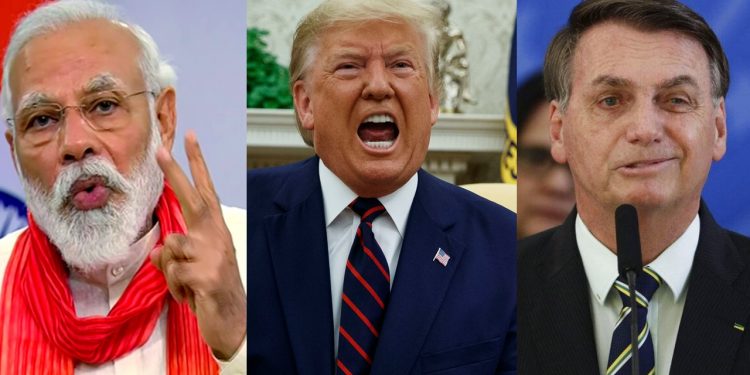Jayati Ghosh
The United States, Brazil, and India have surged ahead of the rest of the world in terms of the number of confirmed COVID-19 cases, with no peak in sight. They (and fourth-place Russia) have one thing in common: macho leaders with authoritarian personalities.
There are notable differences in how these countries have responded to the COVID-19 pandemic. Brazilian President Jair Bolsonaro and US President Donald Trump have consistently downplayed the severity of the threat, and refused to take strong action.
More recently, Trump adjusted his stance somewhat, undoubtedly motivated by his falling approval rating. For example, he has begun wearing a mask in public, after months of refusing to do so – and ridiculing those who did. But he continues to undermine health experts with false and misleading claims. Bolsonaro, for his part, remains cavalier, even after having contracted (and recovered from) COVID-19.
By contrast, Indian Prime Minister Narendra Modi imposed one of the world’s strictest – and most sudden – lockdowns, when only a few cases had been reported in the country. This probably partly explains why the rate of infections per million inhabitants is much lower than it is in the US or Brazil, though independent research suggests that official figures in both India and Brazil are far lower than the actual total.
But Modi’s lockdown wasn’t accompanied by meaningful social protection or income support.
As a result, a large-scale humanitarian tragedy ensued, with millions being plunged into poverty and hunger. Meanwhile, the virus continued to spread, meaning that, when the lockdown was lifted, poor workers faced even greater risks.
The timing and intensity of the US, Brazilian, and Indian responses may have varied, but the results have been the same: millions of COVID-19 infections. The US comes in first, at over five million; Brazil second, with just over three million; and India third, with more than two million.
Their leaders’ personalities have a lot to do with it. Trump, Bolsonaro, and Modi are all known for their arrogance, bluster, and rejection of criticism. They have all shown a demagogic ability to inspire faith in a divisive persona that both repels many and attracts the quasi-religious devotion of many others. They have all diligently served the interests of their friends and constituents above all. And they have all displayed serial contempt for the truth, using distraction, diversion, and outright lies to advance their preferred narratives and maintain their popularity.
These qualities are at the root of the policy mistakes that have driven up the pandemic-related death toll in all three countries. For starters, the distribution of responsibility between federal and state or provincial governments has been unbalanced, arbitrary, and uncoordinated, while central governments – often disregarding science or expert advice – have imposed irrational, frequently changing rules and policies.
State and provincial governments, for their part, have been doing all the heavy lifting, not only in containing the virus, but also in supporting public health more broadly and addressing the pandemic’s economic fallout. Federal governments have done nothing to ensure coordination among these lower-level entities.
Beyond a lack of effective guidance from above, states and provinces have struggled with insufficient resources. The fiscal imbalance is most marked in India, where the central government has denied state governments even the funds that it legally owes them, but it is also evident in Brazil and the US.
More broadly, none of the three countries has increased overall public-health spending. And while governments have offered financial support to ailing companies, the spoils have gone mainly to large corporations, with small businesses forced to make do with scraps. Meanwhile, the poor have received precious little help, especially in India.
The essential workers risking their lives to keep societies functioning – delivering health services, for example, or ensuring food supplies – have also received scant protections or support. Many lack adequate and timely wages, sufficient protective equipment, and even health insurance during the pandemic.
Yet, instead of addressing these lethal failures of leadership, Trump, Bolsonaro, and Modi are creating diversions. Trump would rather rail against China – even withdrawing from the World Health Organisation over its supposed dissemination of Chinese ‘misinformation’ – than implement an effective response. In Modi’s India, years of Hindu-nationalist incitement by his government have made Muslims natural scapegoats.
In all three countries, the aggravation of social divisions – and the encouragement of aggression by dominant groups – long precedes the pandemic. Bolsonaro has a storied history of racist, misogynistic, and anti-LGBTQ rhetoric, and has chipped away at the rights of minority groups. Trump’s similarly divisive track record is exemplified by his amplification of white supremacists and condemnation of ongoing protests against racial injustice and police brutality.
This brings us to another commonality: all three leaders have used the pandemic as an excuse to repress dissent. There has been outcry over Trump’s use of federal forces, often in plain clothes, to crush largely peaceful protests. But in India, much worse is happening: people who have participated in peaceful protests are being arrested. Indian prisons – where COVID-19 is spreading fast – are now home to many human-rights activists, lawyers, teachers, and students.
Brute force cannot stop a virus. Nor can deception, manipulation, bullying, or coercion. As other countries (many with woman leaders) have shown, the only way to defeat COVID-19 is through community involvement, cooperation, and social solidarity. It is no accident that the world’s biggest COVID-19 losers have taken a different path.
The writer is Professor of Economics at Jawaharlal Nehru University in New Delhi, Executive Secretary of International Development Economics Associates, and a member of the Independent Commission for the Reform of International Corporate Taxation. @Project Syndicate.






































